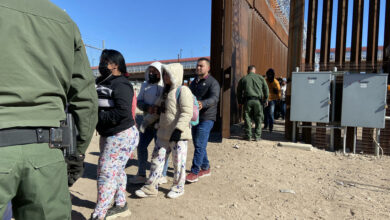Atomic agency chief: idea that nuclear waste cannot be treated is a ‘fallacy’

By Jordi Kuhs
Vienna, Jul 19 (EFE).- The idea that it is not possible to treat nuclear waste is a “fallacy” pushed by those opposed to nuclear power, the head of the International Atomic Energy Agency Rafael Grossi tells Efe.
“Nuclear waste has a way to be treated, there are already countries that are doing it: Finland and Sweden,” the Argentine diplomat adds in reference to plans to build storage units for spent nuclear fuel in the Nordic nations.
“It’s not, as it often mistakenly said, a sort of economically irresponsible activity that hands an unsolvable problem down to future generations,” Grossi says during an interview at the IAEA headquarters in Vienna.
“Lots of solutions exist and, in fact, the nuclear waste that exists occupies a very small volume, not only in Europe but in the whole world, and it is perfectly safeguarded,” Grossi, head of the agency that promotes nuclear security internationally, adds.
“The rejection of nuclear energy on the basis that there is waste that in thousands of years could be released, to me seems such a far-fetched elaboration that I can’t help but be surprised at it.”
A CONTENTIOUS DEBATE
“It’s a very politicized and polarized debate, that we understand and respect,” the director general, who is set to visit Spain this week, says.
European Union lawmakers recently approved the labeling of nuclear investment as green and climate-friendly.
Critics such as Spain’s ecological transition minister Teresa Ribera warned that the change in classification downplayed the risks that atomic energy can entail.
Spain, along with Germany, are among the European countries that have decided to phase out their nuclear plants while France and non-EU member the United Kingdom have vouched for a renewal of nuclear energy.
Grossi believes that Russia’s war in Ukraine has made nuclear renewal more “urgent” in Europe.
“Especially for a number of countries that are heavily dependent on a single source for their gas and want to regain a degree of autonomy in terms of their own energy choices,” he added.
“So, if nuclear was being looked at with increased and intense interest for environmental reasons, now also geopolitical reasons are bringing another argument to the table.”
LESS NUCLEAR MEANS MORE FOSSIL FUELS
Countries such as Germany and Austria have recently announced temporary return to coal plants to shore off a looming energy crisis fueled by Russia’s war in Ukraine, but the IAEA warns against such moves, saying it would hamper climate goals set out in the 2015 Paris Agreement.
“Nuclear is part of the solution now,” Grossi says, pointing out that “half of the clean energy comes from nuclear.”
He also has concerns as to how nuclear power would be replaced if it was abandoned.
“Apparently, this is being replaced with more fossils,” he says.EFE
jk-ll/jt/ks





